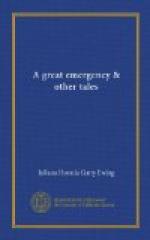If a kind word would have saved the fruits of our week’s hard labour, hot one of us would have spoken it. We sacrifice anything we possess in our ill-tempered family—except our wills.
“And you may take your play, and I’ll take my properties,” continued Philip, gathering up hats, wigs, and what not from the costumes which Alice and I had arranged in neat groups ready for the green-room. “I’ll give everything to Clinton this evening for his new theatre, and we’ll see how you get on without the Fiery Dragon.”
“Clinton can’t want a fiery dragon when he’s got you,” said Charles, in a voice of mock compliment.
The Fairy Godmother’s crabstick was in Philip’s hand. He raised it, and flew at Charles, but I threw myself between them and caught Philip’s arm.
“You shall not hit him,” I cried.
Aunt Isobel is right about one thing. If one does mean to stop short in a quarrel one must begin at a very early stage. It is easier to smother one’s feelings than to check one’s words. By the time it comes to blows it is like trying to pull up a runaway horse. The first pinch Philip gave to my arm set my brain on fire. When he threw me heavily against the cave with a mocking laugh, and sprang after Charles, I could not have yielded an inch to him to save my life—not to earn Fortunatus’ purse, or three fairy wishes—not to save whatever I most valued.
What would have induced me? I do not know, but I know that I am very glad it is not quite so easy to sell one’s soul at one bargain as fairy-tales make out!
My struggle with Philip had given Charles time to escape. Philip could not find him, and rough as were the words with which he returned to me, I fancy they cost him some effort of self-control, and they betrayed to Alice’s instinct and mine that he would have been glad to get out of the extremity to which our tempers had driven matters.
“Look here!” said he in a tone which would have been perfect if we had been acting a costermonger and his wife. “Are you going to make Clinton the Prince or not?”
“I am not,” said I, nursing my elbow, which was cut by a nail on the cask. “I am not going to do anything whatever for Mr. Clinton, and I ought to be cured of working for you.”
“You have lost an opening to make peace,” said an inner voice. “You’ve given the yielding plan a fair trial, and it has failed,” said self-justification—the swiftest pleader I know. “There are some people, with self-satisfied, arbitrary tempers, upon whom gentleness is worse than wasted, because it misleads them. They have that remnant of savage notions which drives them to mistake generosity for weakness. The only way to convince them is to hit them harder than they hit you. And it is the kindest plan for everybody concerned.”
I am bound to say—though it rather confuses some of my ideas—that experience has convinced me that this last statement is not without truth. But I am also bound to say that it was not really applicable to Philip. He is not as generous as Alice, but I had no good reason to believe that kindly concession would be wasted on him.




